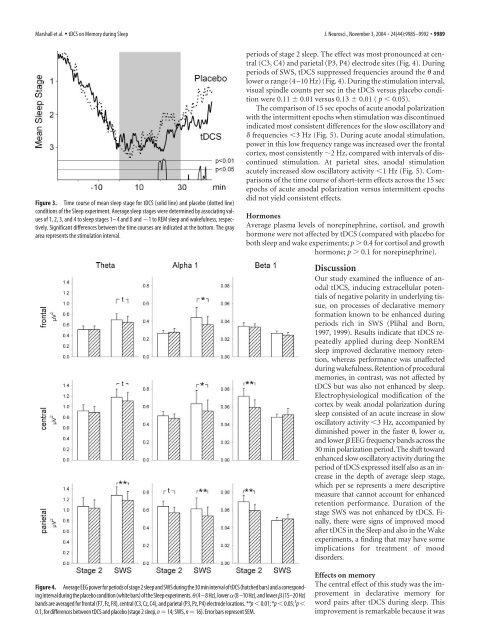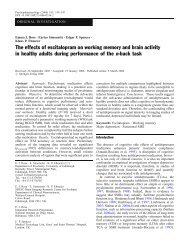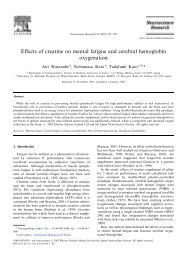Transcranial Direct Current Stimulation during Sleep Improves ...
Transcranial Direct Current Stimulation during Sleep Improves ...
Transcranial Direct Current Stimulation during Sleep Improves ...
You also want an ePaper? Increase the reach of your titles
YUMPU automatically turns print PDFs into web optimized ePapers that Google loves.
Marshall et al. • tDCS on Memory <strong>during</strong> <strong>Sleep</strong> J. Neurosci., November 3, 2004 • 24(44):9985–9992 • 9989Figure 3. Time course of mean sleep stage for tDCS (solid line) and placebo (dotted line)conditions of the <strong>Sleep</strong> experiment. Average sleep stages were determined by associating valuesof 1, 2, 3, and 4 to sleep stages 1–4 and 0 and 1 to REM sleep and wakefulness, respectively.Significant differences between the time courses are indicated at the bottom. The grayarea represents the stimulation interval.periods of stage 2 sleep. The effect was most pronounced at central(C3, C4) and parietal (P3, P4) electrode sites (Fig. 4). Duringperiods of SWS, tDCS suppressed frequencies around the andlower range (4–10 Hz) (Fig. 4). During the stimulation interval,visual spindle counts per sec in the tDCS versus placebo conditionwere 0.11 0.01 versus 0.13 0.01 ( p 0.05).The comparison of 15 sec epochs of acute anodal polarizationwith the intermittent epochs when stimulation was discontinuedindicated most consistent differences for the slow oscillatory and frequencies 3 Hz (Fig. 5). During acute anodal stimulation,power in this low frequency range was increased over the frontalcortex, most consistently 2 Hz, compared with intervals of discontinuedstimulation. At parietal sites, anodal stimulationacutely increased slow oscillatory activity 1 Hz (Fig. 5). Comparisonsof the time course of short-term effects across the 15 secepochs of acute anodal polarization versus intermittent epochsdid not yield consistent effects.HormonesAverage plasma levels of norepinephrine, cortisol, and growthhormone were not affected by tDCS (compared with placebo forboth sleep and wake experiments; p 0.4 for cortisol and growthhormone; p 0.1 for norepinephrine).DiscussionOur study examined the influence of anodaltDCS, inducing extracellular potentialsof negative polarity in underlying tissue,on processes of declarative memoryformation known to be enhanced <strong>during</strong>periods rich in SWS (Plihal and Born,1997, 1999). Results indicate that tDCS repeatedlyapplied <strong>during</strong> deep NonREMsleep improved declarative memory retention,whereas performance was unaffected<strong>during</strong> wakefulness. Retention of proceduralmemories, in contrast, was not affected bytDCS but was also not enhanced by sleep.Electrophysiological modification of thecortex by weak anodal polarization <strong>during</strong>sleep consisted of an acute increase in slowoscillatory activity 3 Hz, accompanied bydiminished power in the faster , lower ,and lower EEG frequency bands across the30 min polarization period. The shift towardenhanced slow oscillatory activity <strong>during</strong> theperiod of tDCS expressed itself also as an increasein the depth of average sleep stage,which per se represents a mere descriptivemeasure that cannot account for enhancedretention performance. Duration of thestage SWS was not enhanced by tDCS. Finally,there were signs of improved moodafter tDCS in the <strong>Sleep</strong> and also in the Wakeexperiments, a finding that may have someimplications for treatment of mooddisorders.Figure4. AverageEEGpowerforperiodsofstage2sleepandSWS<strong>during</strong>the30minintervaloftDCS(hatchedbars)andacorrespondinginterval<strong>during</strong>theplacebocondition(whitebars)ofthe<strong>Sleep</strong>experiments.(4–8Hz),lower(8–10Hz),andlower(15–20Hz)bandsareaveragedforfrontal(F7,Fz,F8),central(C3,Cz,C4),andparietal(P3,Pz,P4)electrodelocations.**p0.01;*p0.05; t p0.1,fordifferencesbetweentDCSandplacebo(stage2sleep,n14;SWS,n16).ErrorbarsrepresentSEM.Effects on memoryThe central effect of this study was the improvementin declarative memory forword pairs after tDCS <strong>during</strong> sleep. Thisimprovement is remarkable because it was




